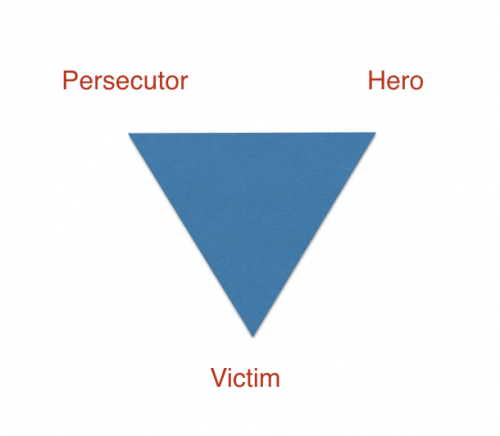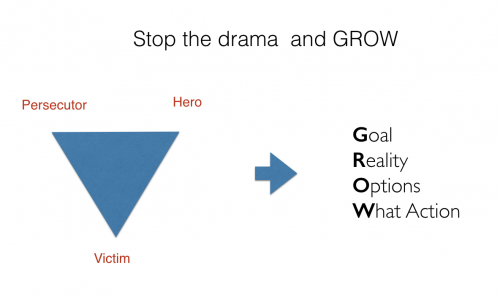
Have you found yourself binge-watching the Netflix series or impatiently waiting for next week’s Scandinavian Noir episode to come on screen?
If you have, it is probably because you were attracted by the unfolding drama.
So let me quickly show you how it is done.
All the great stories are built on the same principle. You need three elements. A victim, someone who get into trouble. And in order for that to happen, we need a persecutor, someone or something that does the bad stuff. And then of course, we need someone to save our poor victim, a hero.
That in all its simplicity is the mechanics of the drama triangle. And if you pay attention, you will see that many of your favourite books and films follow that structure.

Now if you would like to spice this up a bit and make it run forever and ever. You let the participants change roles. Suddenly the hero is the victim. The persecutor becomes the new hero and the former victim is now the persecutor. If you have ever had the opportunity to watch Elisabeth Taylor and Richard Burton in “Who’s afraid of Virginia Woolf”, then you will recognise that this is what unfolds for the two riveting hours the movie runs. It is a masterful demonstration of the drama triangle.
Great entertainment, emotions all over the place, but no learning and no solutions.
Unfortunately, many of us chose to play out these drama triangles in our own lives with the same result. Lots of emotion no solution.
We make victims of ourselves as we complain about traffic, the boss or the weather. We call our best friend each Friday evening and once again ask so how is the job going, well knowing that it will be the same sob-story as last week (The job is a disaster, the boss is an idiot etc.) but we satisfy our inner hero by encouraging our poor friend to tell that story again and again.
Or even worse, we give space to our inner persecutor by criticising a spouse or colleague only to turn around the next minute and be their hero by telling them not to take it so hard etc.
On and on it goes, you probably have your own version.
Just watch in your next management meeting, how this unfolds time and again, and how you already know who is going to play what role. Only here there is not much entertainment because we know the script and it is so, so boring.
We need to break the habit and stop playing this game with each other. The trick is to make a conscious decision to GROW out of it. There are no constructive solutions in a drama triangle. And the way to stop it is to ask yourself or your colleague the magic question: What would you like to do about it? Or what do we need to achieve?
This is where the GROW coaching process comes in handy. It is your magic wand that instantly dissolves the drama triangle:
- What would we like to achieve? (Goal)
- What is the current Reality?
- What are our Options?
- What are we going to do now? (Will)
Every time we find ourselves in one of the three drama triangle roles, we need to apply this simple but powerful process. It stops the drama, creates solutions and furthers our learning and development.
And all it takes is one simple question: What would I like to create?
 This the eighth blog post in a series where Mike is exploring: Why and how to develop not just yourself but also the people around you?
This the eighth blog post in a series where Mike is exploring: Why and how to develop not just yourself but also the people around you?
Building capacity is at the heart of the Service Profit Chain. If you are not familiar with the intricacies of the Service Profit Chain, we have a special treat for you:
For this month only, you can access The Essential Leadership Instrument course on Mike’s training library for FREE using this coupon A2A3HUVRWV. It is only available for the first 50 people so first come first serve! Sign up HERE!
